Long Hot Summer
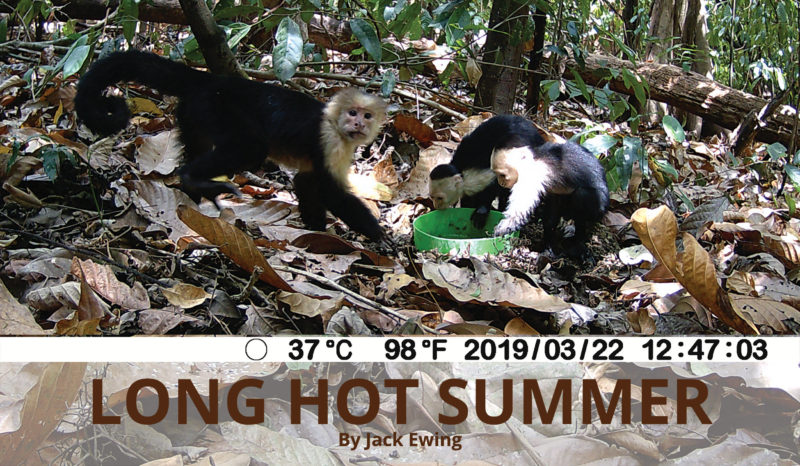 Dealing with the Dry Season
Dealing with the Dry Season
It wasn’t supposed to rain, but we all know that the weather bureau doesn’t necessarily get it right. At the sound of the first drops on the roof I went outside and stood there, my shoulders thrown back and my face to the heavens. The cool water washed over me, and soaked my clothes, but I didn’t care. It had been a long time, and it felt wonderful. The last rain had been on December 16, and it was now April 4. We had endured 109 days of drought. It was so bad that many places in Costa Rica had to ration water. I know of several nearby communities where the water flowed through the pipes to people’s homes only two hours each day. During the other 22 hours the sparse stream of water from the local spring flowed into reserve tanks from which the two hours of daily water were supplied. Most people used that two hours to fill buckets, jugs, pots, pans, and other recipients, and if any was left, they bathed quickly hoping it wouldn’t stop flowing just after soaping up. Hopefully by the time you read this, it be raining regularly and the crisis will be over.
This year the flow of the Barú River diminished to the point that the wave action on the beach was able to create a sand dam across the river mouth. The small amount of water coming downstream, unable to flow out into the ocean, has backed up more than a kilometer and converted the Barú River into a lake. Fresh water from that lake flows into the mangrove estuary flooding the dry, cracked bottom. Fish, caimans, crocodiles, and loads of amphibians are happy with this new found water, but animals that live farther from the river are not so lucky. In fact we have found dead sloths whose deaths are presumably related to the drought. The leaves they feed on are so dry that the water they contain isn’t enough to sustain the sloths.
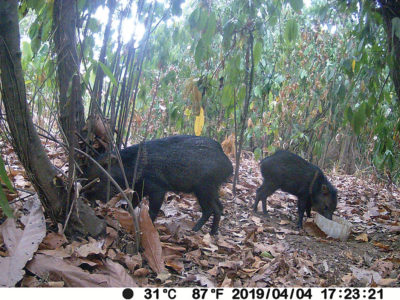 Different species deal with the dryness in different ways. As the normal water sources such as streams, ponds and swamps, recede the wildlife concentrates around the last remaining water holes. Competition for water can be fierce, and only the strongest manage to get a drink. The weaker perish. Predators usually lurk near sources of water both for the water itself and for the prey animals that come to drink. It isn’t unusual to see a caiman on a bone dry hiking trail wandering around looking for water. We once found one on a rainforest covered hillside at least a kilometer from the nearest water. Probably the few small ponds and the river had been taken over by bigger stronger caimans, and the weaker individuals either found water somewhere else or died. The same thing happens with otters. When the river shrinks to the point that there is room for only a few, the least able to secure and defend a territory must leave the river and search elsewhere. I have seen southern river otters on dry land more than half a kilometer from water.
Different species deal with the dryness in different ways. As the normal water sources such as streams, ponds and swamps, recede the wildlife concentrates around the last remaining water holes. Competition for water can be fierce, and only the strongest manage to get a drink. The weaker perish. Predators usually lurk near sources of water both for the water itself and for the prey animals that come to drink. It isn’t unusual to see a caiman on a bone dry hiking trail wandering around looking for water. We once found one on a rainforest covered hillside at least a kilometer from the nearest water. Probably the few small ponds and the river had been taken over by bigger stronger caimans, and the weaker individuals either found water somewhere else or died. The same thing happens with otters. When the river shrinks to the point that there is room for only a few, the least able to secure and defend a territory must leave the river and search elsewhere. I have seen southern river otters on dry land more than half a kilometer from water.
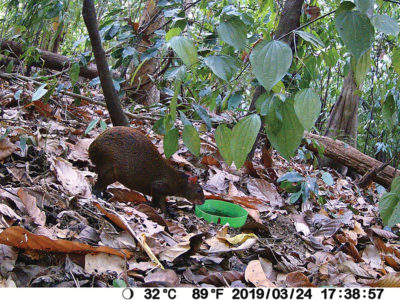 Some species do better than others. Late in the dry season many trees fill with fruits, which contain life giving moisture that will sustain the fructivores for as long as the season lasts. Predators benefit from the body fluids of their prey. Wildlife sightings around houses and hotels increase during the dry season because the animals have learned that where there are humans there is water, and there is always a chance of finding a drip or a discarded container with a little water. Not long ago something chewed through a PVC water pipe at Hacienda Barú to get a drink. The incisor marks on the tube looked like those of an agouti or a paca. We always have lots of spiny tailed iguanas and agoutis around our gardens at Hacienda Barú Lodge, and during this exceptionally dry period there have been more than ever. Sometimes we even have to shoo the iguanas out of the restaurant. The other day one snuck in while a guest was eating breakfast, climbed up on a chair, from there onto the table, looked around for some water, finding none it stole the man’s egg and ran away. Fortunately the gentleman wasn’t upset by the experience. “Wait till I tell my wife and kids,” he exclaimed.
Some species do better than others. Late in the dry season many trees fill with fruits, which contain life giving moisture that will sustain the fructivores for as long as the season lasts. Predators benefit from the body fluids of their prey. Wildlife sightings around houses and hotels increase during the dry season because the animals have learned that where there are humans there is water, and there is always a chance of finding a drip or a discarded container with a little water. Not long ago something chewed through a PVC water pipe at Hacienda Barú to get a drink. The incisor marks on the tube looked like those of an agouti or a paca. We always have lots of spiny tailed iguanas and agoutis around our gardens at Hacienda Barú Lodge, and during this exceptionally dry period there have been more than ever. Sometimes we even have to shoo the iguanas out of the restaurant. The other day one snuck in while a guest was eating breakfast, climbed up on a chair, from there onto the table, looked around for some water, finding none it stole the man’s egg and ran away. Fortunately the gentleman wasn’t upset by the experience. “Wait till I tell my wife and kids,” he exclaimed.
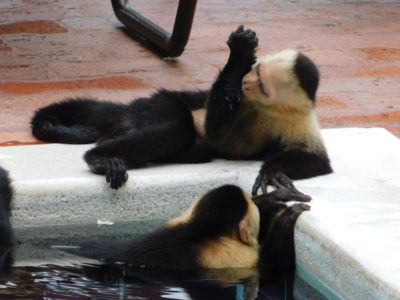 In mid-March, after three months without rain we decided to place some shallow containers in a nearby forest and keep them filled with water. The idea was to help relieve the stress on the wildlife. Monkeys, agoutis, great curassows, and peccaries all found the water and loved it. The monkeys seemed more intent on sitting in the water and splashing in it on themselves than drinking it. When streams are flowing monkeys can often be seen playing in the water like a bunch of kids. They also like swimming pools, especially those located near the jungle.
In mid-March, after three months without rain we decided to place some shallow containers in a nearby forest and keep them filled with water. The idea was to help relieve the stress on the wildlife. Monkeys, agoutis, great curassows, and peccaries all found the water and loved it. The monkeys seemed more intent on sitting in the water and splashing in it on themselves than drinking it. When streams are flowing monkeys can often be seen playing in the water like a bunch of kids. They also like swimming pools, especially those located near the jungle.
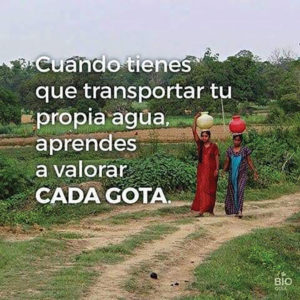 In the 1970s and 80s we lived in a place where the free flowing spring that supplied our house with water always dried up in mid-January. From then until it started flowing again a large portion of our daily routine involved water in one way or another. Diane drove the girl who helped around the house to the river to wash clothes. Water for washing dishes and flushing toilets came from the river in 55 gallon drums. Drinking water came from another spring a couple of kilometers away, but still on Hacienda Barú. The one part of the dry season that we really enjoyed was bathing. At 4:00 pm every afternoon Diane, the kids, I, and the dogs all piled in the jeep and drove to the Barú River for the ritual afternoon bath. The village of Dominical didn’t have a drop of water either, so the whole town, about 10 people, showed up for bath time too. We all had a blast, splashing around, soaping up and rinsing off, discussing local goings on, and just having fun. The long dry summer caused many difficulties and lots of extra work, but the afternoon bath was a great stress reliever that we all looked forward to.
In the 1970s and 80s we lived in a place where the free flowing spring that supplied our house with water always dried up in mid-January. From then until it started flowing again a large portion of our daily routine involved water in one way or another. Diane drove the girl who helped around the house to the river to wash clothes. Water for washing dishes and flushing toilets came from the river in 55 gallon drums. Drinking water came from another spring a couple of kilometers away, but still on Hacienda Barú. The one part of the dry season that we really enjoyed was bathing. At 4:00 pm every afternoon Diane, the kids, I, and the dogs all piled in the jeep and drove to the Barú River for the ritual afternoon bath. The village of Dominical didn’t have a drop of water either, so the whole town, about 10 people, showed up for bath time too. We all had a blast, splashing around, soaping up and rinsing off, discussing local goings on, and just having fun. The long dry summer caused many difficulties and lots of extra work, but the afternoon bath was a great stress reliever that we all looked forward to.
We didn’t quite get to the point that we had to carry jugs of water on our heads, like the ladies in the photo, but we did learn to appreciate every single drop.

